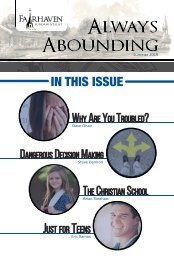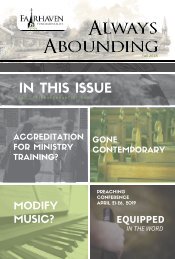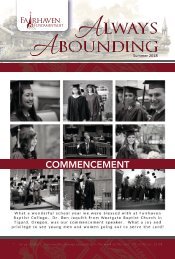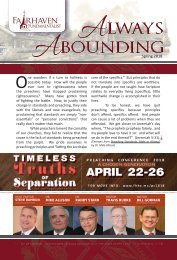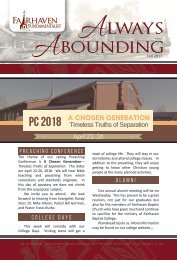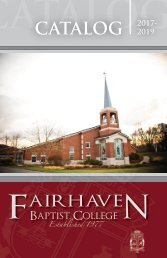Always Abounding - Spring 2016
You also want an ePaper? Increase the reach of your titles
YUMPU automatically turns print PDFs into web optimized ePapers that Google loves.
Fundamentalist<br />
<strong>Always</strong><br />
<strong>Abounding</strong><br />
<strong>Spring</strong> <strong>2016</strong><br />
Building Strong Families<br />
A<br />
common theme in American<br />
churches is building families. A<br />
simple search on the Internet<br />
will produce thousands of results for<br />
churches, para-church organizations,<br />
and secular organizations that are trying<br />
to build strong families. The amazing<br />
thing is that most churches do not<br />
seem to adhere to Biblical standards<br />
anymore when it comes to the family<br />
unit.<br />
The family unit has changed<br />
drastically since the mid-1900s.<br />
Commenting on the results of the 2010<br />
U.S. Census, The New York Times reported<br />
that “married couples represented just 48<br />
percent of American households in 2010....<br />
This was slightly less than in 2000, but<br />
far below the 78 percent of households<br />
occupied by married couples in 1950.”<br />
In this issue. . .<br />
Meet a Fairhaven Student<br />
The Nursing Home Ministry<br />
The Tale of Two Worlds<br />
Navigating Technology<br />
About Evangelism<br />
Missions<br />
Getting Your Child to Obey<br />
This same trend is sadly seen in many<br />
churches. The traditional family is broken<br />
and almost seems to be an endangered<br />
species. Local churches need to analyze<br />
the Scriptures to make sure their<br />
philosophy and practices are being a help<br />
to the families in their church rather than<br />
being a hindrance. I am going to mention<br />
a couple of things that have helped us over<br />
the last few years to be a help to families in<br />
our church. Some of the items may seem<br />
over simplified, but in dealing with some<br />
issues, keeping things simple can be a help.<br />
First, a good Christian school can be a<br />
huge asset to the family. The trend for the<br />
past decade or so in America has been for<br />
(cont., page 3)<br />
“. . . be ye stedfast, unmoveable, always abounding in the work of the Lord” I Corinthians 15:58
CONTENTS<br />
1 Building Strong Families<br />
by Pastor Steve Damron<br />
5 The Nursing Home Ministry<br />
by Pastor Travis Burke (‘97)<br />
6 Meet a Fairhaven Student<br />
Caleb Rouillard<br />
7 The Tale of Two Worlds<br />
An Allegory by Pastor Archie Parrish<br />
8 Navigating Technology<br />
by Pastor Dave Mallinak (‘93)<br />
10 About Evangelism<br />
by Dr. Randy Starr<br />
12 Missions: Expected and Attempted<br />
by Pat Gordon (‘88)<br />
14 Getting Your Child to Obey<br />
by Dave Olson<br />
15 Upcoming Events<br />
©Published by Fairhaven Baptist Church. For correspondence or change in subscription information,<br />
write: Fairhaven Baptist Church, <strong>Always</strong> <strong>Abounding</strong> - The Fairhaven Fundamentalist, 86 East Oak Hill<br />
Road, Chesterton, IN 46304, U.S.A. For more information, call (800) SEE-FHBC.<br />
2 │ <strong>Always</strong> <strong>Abounding</strong>
Building Strong Families<br />
(cont.)<br />
Pastor Steve Damron<br />
churches to stop having Christian schools.<br />
I believe the reason for the decline is<br />
because of the conflict that seems to<br />
occur between the church authority and<br />
home authority. The sad point about this<br />
trend is the horrible decline in the church’s<br />
influence in our nation. With the Christian<br />
school movement on the decline, our<br />
country has become weaker as a Christian<br />
nation, not stronger.<br />
We have striven to have a godly<br />
philosophy in our school since its inception<br />
over 40 years ago. At some point, our<br />
children need to mature and learn that<br />
there are other<br />
authorities besides<br />
dad and mom. A<br />
good Christian<br />
school will help a<br />
parent in this area.<br />
I do keep stressing<br />
a good Christian<br />
school because most<br />
“Christian” schools<br />
are no more than<br />
private education<br />
centers. They are no<br />
more Christian than<br />
the fashion designer<br />
Christian Dior, and are<br />
Christian in name only. Churches need<br />
to make sure that a Christian school is a<br />
help to the home. The Christian school<br />
should have godly teachers, a godly<br />
curriculum, and a godly philosophy. I am<br />
personally thankful for the school out<br />
of our church. It has enabled my wife<br />
and me to surpass our expectations with<br />
our children academically. The teachers<br />
have also been a huge help spiritually in<br />
finding weaknesses in our children. A<br />
good Christian school will provide a great<br />
avenue for the parents and staff to work<br />
FAMILY<br />
together to provide laborers for God’s<br />
harvest.<br />
Second, a good youth group in a church<br />
is a great asset to the family. Again, I stress<br />
a good youth group. A youth group is not<br />
a babysitting service. The youth pastor<br />
should feel a calling and have a strong<br />
desire to work with the youth in the<br />
church. Through the combined 60 years<br />
experience of my own youth pastor (when<br />
I was young), our church’s current youth<br />
pastor, and myself, I have seen the benefits<br />
of having a youth group. I believe that<br />
the church leadership must assess at least<br />
once a year how the church and its families<br />
work together.<br />
There are always<br />
adjustments that<br />
need to be made with<br />
the youth group and<br />
the families in your<br />
church. Just because<br />
something worked<br />
five years ago in your<br />
church schedule,<br />
does not mean that<br />
it will work effectively<br />
now. Family concerns,<br />
cultural adjustments,<br />
and time constraints<br />
change over the<br />
course of a church’s history. You must be<br />
willing to sit down and adjust things as a<br />
church so that you are not irritating the<br />
good families in your church. I say all of this<br />
to show you that the church and the family<br />
should work together to produce godly<br />
young people. Working together produces<br />
a good, godly balance in maturing young<br />
people to love the Lord with all of their<br />
heart.<br />
I would like to challenge the dads and<br />
moms reading this article. It is our job to<br />
instruct our children in the ways of the<br />
(cont., page 4)<br />
www.fairhavenbaptist.org │ 3
FAMILY<br />
Building Strong Families<br />
(cont.)<br />
Word of God. We should have a goal for<br />
our children to eventually have a Proverbs<br />
3:5-6 philosophy. They should grow to<br />
trust in the Lord with all of their heart.<br />
This is a daunting task, and the church can<br />
be a huge help in accomplishing it. You<br />
do not find in the New Testament where<br />
the church and the family are in conflict.<br />
They should be working cohesively to<br />
Christians who faced crises: “We are<br />
troubled on every side, yet not distressed;<br />
we are perplexed, but not in despair;<br />
Persecuted, but not forsaken; cast down,<br />
but not destroyed” (II Corinthians 4:8-9).<br />
Paul and these faithful Christians relied on<br />
God for strength and help to endure trials.<br />
You, too, can build a strong family for God<br />
if you rely on His strength!<br />
accomplish God’s will in the homes of the<br />
believers in the church.<br />
There are many obstacles that face<br />
parents and churches today. Some<br />
obstacles or challenges are external such<br />
as Hollywood, an immoral culture, and the<br />
anti-authority attitude; some are internal<br />
such as our flesh’s desire to control our<br />
walk in this world. I would challenge<br />
you to be inspired by the Apostle Paul’s<br />
description of the resilience of first-century<br />
4 │ <strong>Always</strong> <strong>Abounding</strong>
The Nursing Home Ministry<br />
Pastor Travis Burke (‘97)<br />
At the age of sixteen, I knew the<br />
Lord was calling me to preach His<br />
Word. One week after surrendering<br />
to this calling, my pastor sent me to<br />
our nursing home to preach my first<br />
message. I have never stopped going.<br />
One of the most important outreaches<br />
a church can have is a nursing home<br />
ministry. Sadly, many churches do<br />
not see the great need of ministering<br />
to the residents at these facilities.<br />
All nursing home residents have souls,<br />
and they make up a part of “all people”<br />
of the Great Commission. These lives<br />
can still be reached with the gospel,<br />
taught the doctrines of Scripture,<br />
and used of God to reach other<br />
souls before it is eternally too late.<br />
A church’s own members can be greatly<br />
edified and strengthened through the<br />
nursing home ministry. As stated, my<br />
first opportunity to preach was in a<br />
nursing home service. Many members<br />
of our church participate in this weekly<br />
ministry. They have grown to love the<br />
residents, learn from God’s Word, and<br />
lead others to Christ. This excitement<br />
carries over into our church services, and<br />
our entire congregation is encouraged.<br />
It is my experience that nursing homes<br />
are made up of people who are lost and<br />
close to an eternity in hell as well as people<br />
who are saved and need encouraged in the<br />
Lord, corrected in doctrine, and edified<br />
to serve the Lord in their latter years.<br />
Often a nursing home service is viewed<br />
as “entertainment” when it could be a<br />
time greatly used of God to encourage. I<br />
normally hold a forty-five minute service<br />
each week. A collection of numbered<br />
hymns is distributed. Residents share<br />
prayer requests, and specific prayer is<br />
offered on their behalf. Next, we teach<br />
MINISTRY HELPS<br />
a simple object lesson that emphasizes<br />
that God’s grace is not earned, but<br />
given as a gift—we call this the “grace<br />
gift.” We place a sticker on one of the<br />
hymn pages, and the resident who<br />
receives this page receives a special gift.<br />
It is important to learn names and be<br />
personal to the residents. We plan vocal<br />
or instrumental music as special music.<br />
We always end our time together with<br />
the song, “Mansion Over the Hilltop.” The<br />
forty-five minutes are generally as follows:<br />
Welcome and Singing — 6:30-6:40<br />
Prayer Requests and Prayer — 6:40-6:45<br />
Grace Gift & Shaking Hands — 6:45<br />
Congregational Singing — 6:45-6:50<br />
Special Music — 6:50-6:55<br />
Message — 6:55-7:10<br />
Closing Congregational Song — 7:10-7:15<br />
Time is spent afterward walking residents<br />
back to their rooms and visiting those<br />
unable to attend. The Lord has blessed<br />
with souls saved, hearts encouraged, and<br />
the opening of doors to residents’ families;<br />
in fact, I have had the privilege of preaching<br />
many funerals and sharing the gospel with<br />
families I otherwise would have never been<br />
able. We have folks in our weekly services<br />
at church who were reached through our<br />
nursing home ministry. May the Lord use<br />
your nursing home ministry to do the same!<br />
(Travis Burke has been the pastor of Cozaddale Baptist<br />
Temple in Goshen, Ohio, since 2004.)<br />
The Elderly In God’s Word <br />
By: Travis Burke <br />
A series of messages<br />
A series of messages designed for a <br />
nursing home ministry. The messages <br />
highlight many of the elderly characters <br />
as found designed in God’s Word. for use in a<br />
Messages highlight how God uses <br />
everyone in their elderly years and how <br />
he can use folks today. <br />
Books may be obtained by a <br />
For recommended information<br />
offering of $5 to: <br />
Cozaddale Baptist Temple <br />
10632 Eltzroth Road <br />
on Goshen, ordering Ohio 45122 Pastor<br />
or by calling <br />
Burke’s book, please<br />
(513)722-‐2064<br />
nursing home ministry.<br />
call (513) 722-2064.<br />
www.fairhavenbaptist.org │ 5
COLLEGE NEWS<br />
Meet an FBC Student<br />
Caleb Rouillard<br />
Hi, my name is<br />
Caleb Rouillard. I am<br />
French Canadian,<br />
born and raised<br />
in the province of<br />
Quebec, Canada.<br />
I was born as the<br />
fourth son and the<br />
ninth child of my parents. Overall, I have<br />
seven sisters and five brothers, which is<br />
something that often surprises people.<br />
This means that I grew up in a slightly<br />
larger-than-usual family. Many friends and<br />
acquaintances have said, “It’s one thing<br />
seeing a big family these days, and it’s<br />
another thing seeing a big family where<br />
all the children have the same parents.”<br />
Having so many siblings has taught me<br />
many things that I now see will be useful<br />
for the ministry. I thank God for giving me<br />
the family that I have.<br />
I grew up in a Christian home that<br />
places God and the Bible as our authority.<br />
At the age of five, I attended a small<br />
summer day camp where I got saved. I<br />
remember the teacher talking about Jesus<br />
and how He died on the cross. I felt guilty<br />
about what I did to Jesus, and I wanted<br />
Him to forgive me of all my sins. After the<br />
teacher finished her lesson, she took me<br />
apart from the rest of the class, and I asked<br />
Jesus to forgive me of my sins.<br />
A year after my salvation, my family<br />
began attending Eglise Baptiste du Berger<br />
(Shepherd Baptist Church), which is<br />
pastored by Christopher Hilmer, a graduate<br />
of Fairhaven Baptist College. Eglise Baptiste<br />
du Berger is very missions-oriented, and<br />
that has affected my life greatly. My<br />
pastor would have missionaries come to<br />
our church to present their ministries.<br />
Although I was young, this had a big impact<br />
on my life. Seeing missionaries and their<br />
fields opened my eyes to the mission field.<br />
Every time a missionary would present his<br />
mission, I would have a burden to do what<br />
the missionary was doing. I would see so<br />
many lost souls in their presentations, and<br />
I wanted to reach them, too.<br />
At the age of eleven, I felt God’s call<br />
to the mission field after watching a<br />
documentary of missionaries reaching<br />
the lost in Eastern Africa. Two years later,<br />
I surrendered to the mission field at a<br />
Christian summer camp. Several years<br />
later at a youth conference in Ontario, the<br />
preacher spoke about the mission field at<br />
home and throughout Canada. He listed<br />
statistics about how few churches were in<br />
Canada and told us that of those churches,<br />
sixteen were without pastors. I could not<br />
imagine so many Canadians going to hell<br />
and not doing anything about it. I realized<br />
then that God was calling me to minister to<br />
the souls of Canada.<br />
Since I was a boy, I have enjoyed<br />
anything that dealt with the military.<br />
When God called me to the mission field, I<br />
realized that joining the army could not be<br />
God’s will for my life. I began praying about<br />
where the Lord would want me to serve in<br />
Canada. For a year, I did not know, but God<br />
used a guest speaker—a retired American<br />
reservist and an active Coast Guard<br />
chaplain—to give me a burden for the lost<br />
souls in the Canadian armed forces. How<br />
amazing God is to take a lifelong interest<br />
and make it my lifelong calling!<br />
Knowing what God wanted with my<br />
life, I spoke with my pastor and prayed<br />
about the next step to take. The Lord led<br />
me to attend Fairhaven Baptist College<br />
to get a Biblical foundation. I am in the<br />
second semester of my freshman year,<br />
studying Pastoral Theology. The Lord has<br />
blessed me in my studies, and I am looking<br />
forward to seeing what He has in store for<br />
me.<br />
6 │ <strong>Always</strong> <strong>Abounding</strong>
The Tale of Two Worlds:<br />
An Allegory<br />
Pastor Archie Parrish<br />
It was the best of worlds; it was the worst<br />
of worlds. He had a loving father; he had<br />
a prison warden. He had a wonderful<br />
home; he had a prison cell. He had a<br />
promising future; he had a pitiful future.<br />
He had servants; he had guards. It was a<br />
reality; it was a virtual reality. It is a tale of<br />
two worlds.<br />
In these two worlds lived one man<br />
simultaneously. Physically, he lived in the<br />
world of reality. Mentally, he lived in the<br />
world of virtual reality. Although reality<br />
said that his world was great, he longed<br />
for the “real life” his mind’s virtual world<br />
promised him. Demanding his inheritance<br />
from his father, this young man set out to<br />
live in the fantasy world he had imagined.<br />
For a time, it was just as he had<br />
dreamed. The wine flowed freely, the<br />
money flowed freely, and the girls and his<br />
friends adored him.<br />
However, one day, his virtual reality<br />
hit some glitches. There was a famine in<br />
the land. He ran out of money. His friends<br />
deserted him. “No man gave unto him.”<br />
He was forced to eat the slop of pigs.<br />
Still, the incredible graphics and<br />
amazing effects of his mental virtual world<br />
concealed reality. Perhaps he thought<br />
he could give the real world a “thumbs<br />
down,” and he would never see it again.<br />
Maybe this was just a “reality” show; and<br />
if he succeeded, there was a camera crew<br />
and one million dollars waiting for him just<br />
beyond the pig farm. Maybe there was a<br />
token buried in the mud that would lead<br />
to a different level in this video game of his<br />
life. Regardless of the reason, he remained<br />
blind to reality.<br />
Eventually, however, his “virtual<br />
goggles” fell off. When he “came to<br />
himself,” he saw a different world. His real<br />
TEEN CORNER<br />
world was a pig sty; his father’s house was<br />
a haven. Now, he just wanted to be home<br />
with his father. Repenting and forsaking<br />
his self-made pig pen, he headed home.<br />
Nearing home, he saw his father—the<br />
prison warden of his virtual life—and<br />
ran to him. Hugging and clothing his son<br />
with the cloak and ring of authority, his<br />
father proclaimed him loved, forgiven, and<br />
restored.<br />
While his virtual world had come to an<br />
end, he now lived in a joyous reality.<br />
Many teenagers create a virtual world<br />
in their minds just like the prodigal son.<br />
“Friending” and “unfriending” people with<br />
the click of a mouse or the tap of a finger,<br />
they have no concept of reality. Then,<br />
when the famine comes, they are unable<br />
to cope in a real world.<br />
Learn a lesson from the prodigal<br />
son. Choose the reality of your Heavenly<br />
Father’s eternal love instead of the virtual,<br />
temporal love of a cruel world.<br />
The world will forsake you. The Father<br />
will not. That is reality!<br />
(Archie Parrish is the youth pastor at Fairhaven<br />
Baptist Church.)<br />
www.fairhavenbaptist.org │ 7
CURRENT ISSUES<br />
Navigating Technology<br />
Pastor Dave Malliank (‘93)<br />
According to legend, in 1779 Ned<br />
Ludd smashed two mechanical<br />
stocking frames, launching a<br />
Luddite revolution of rage against<br />
machines. The term “Luddite” eventually<br />
came to be associated with the fear of<br />
technology and technological change,<br />
but the original Luddites were more<br />
concerned that business owners valued<br />
machines above their workers. Eventually,<br />
the British Parliament outlawed “machine<br />
breaking”—laws which apparently do not<br />
apply to Fords or laptops.<br />
No doubt many sympathize with the<br />
Luddites. The new American posture is<br />
hunched over the cell phone texting. We<br />
are distracted, preoccupied, unfeeling,<br />
apathetic, cold, mechanical, superficial,<br />
caught up in the virtual world at the<br />
expense of the real. We wish that<br />
our lives could be as wonderful as we<br />
make them appear on Facebook. Our<br />
technological explosion strips away<br />
our values and robs us of our souls.<br />
As a result, some Christians have<br />
gone the Amish route, rejecting any<br />
technology made after they turned forty.<br />
Others live by the “gotta have it” creed.<br />
They wholeheartedly and uncritically<br />
embrace every technological advance.<br />
Their cell phone is their lifeline. They<br />
camp out at Best Buy before Black<br />
Friday, think Cyber-Monday should<br />
be a national holiday, and anxiously<br />
await the next version of the iPhone.<br />
Technophobes reject technology;<br />
technophiles relish it. Both take a wrong<br />
view. We cannot reject all technology<br />
outright. Rejecting the keyboard in<br />
favor of pen and paper does not qualify<br />
as a rejection of technology: only as a<br />
rejection of a certain era of technology.<br />
The Amish arbitrarily reject technologies<br />
made after the mid-1800s. They do not<br />
reject all technology. Technology itself<br />
is inescapable. But Christians must not<br />
embrace it uncritically. God commands us<br />
to “prove all things, hold fast that which is<br />
good.” All things considered, technology is<br />
a blessing. Be glad you don’t need to wash<br />
your clothes on a rock or a washboard.<br />
How then should a Christian approach<br />
technology? First, we should understand<br />
that technology is good. Although God<br />
did not create technology, He did ordain<br />
our use of it. How else was man to<br />
dress and keep the garden? And when<br />
God told Adam to name the animals, He<br />
ordered technology. Anthropologists<br />
have long identified language as the first<br />
8 │ <strong>Always</strong> <strong>Abounding</strong>
technology—a tool for communication.<br />
As God used words to create the world,<br />
mankind also uses words to create. Think<br />
of all we have made with computer code.<br />
Secondly, Christians must understand<br />
that technology has a bias and a set of<br />
values. Technology is not neutral. If you<br />
try to drive a screw with your cell phone,<br />
you will run into trouble. The screwdriver<br />
app has yet to be developed, Dr. Who<br />
aside. Every different technology has its<br />
own unique bias—a way that it insists<br />
on being used. Bluetooth speakers play<br />
music differently than a bassoon. My<br />
father taught me that there is a right<br />
way and a wrong way to wax the car.<br />
Imagine that: right and wrong applied<br />
to a chamois. Every technology has its<br />
own unique set of values, whether a<br />
wrench, a car, a blog, or a coffeemaker.<br />
Technologies have values, but they<br />
also shape values. Many people now<br />
prefer text messages to phone calls. We<br />
would rather google a question than ask<br />
someone who knows. We would rather<br />
drive than walk. Technology has changed<br />
what we value. Think of the way television<br />
and social media teach us what to think<br />
about world events, tell us what matters,<br />
and insist that we all yield our individuality<br />
to the tyranny of “cool culture.”<br />
Thirdly, Christians should understand<br />
that technology empowers and enslaves.<br />
Technology extends our natural powers<br />
in phenomenal ways. Our devices enable<br />
us both to see and hear our loved ones<br />
from across the world through video<br />
conferencing. Our feet can carry us<br />
long distances in short times thanks<br />
to airline travel. We can do so much<br />
more because of our devices. I recently<br />
replaced the windows on my house,<br />
having never done windows before. How<br />
did I learn? I watched YouTube videos.<br />
Because technology empowers us so<br />
much, we have become very dependent<br />
on our devices. But the more we<br />
depend on them, the more they demand<br />
from us. Probably the best example<br />
of the enslaving power of technology<br />
is the way our cell phones dominate<br />
our lives. Every ring, buzz, or blink<br />
beckons us to pay attention, and we do.<br />
Technology shapes us, but technology<br />
also exposes us, revealing what is in<br />
our hearts. Covetous people spend<br />
hours searching. Lustful people<br />
spend hours viewing. Self-absorbed<br />
people spend hours Facebooking. For<br />
many, cell phones and accessories<br />
are more about status than utility.<br />
Technology projects what you really are.<br />
So, while technology is a blessing,<br />
we must not set our hearts on the riches<br />
offered us by means of our devices.<br />
We cannot serve God and mammon.<br />
Examine the demands that technology<br />
makes on you; examine yourself and your<br />
use of technology; examine the values<br />
technology promotes; and receive the<br />
wealth of technology with a heart of<br />
submission and gratitude towards God.<br />
(Dave Mallinak has been the pastor of Berean Baptist<br />
Church in Ogden, Utah, since 2001.)<br />
www.fairhavenbaptist.org │ 9
OUTREACH<br />
About Evangelism<br />
Dr. Randy Starr<br />
“…woe is unto me, if I preach not the gospel!”<br />
~ I Corinthians 9:16b<br />
The word evangelism is a form of<br />
the word gospel. Evangelism has<br />
the word angel in it which means<br />
“messenger or proclaimer of the news.”<br />
Evangelism means “to herald, proclaim, or<br />
announce the good news.” The evangelist<br />
is “one who proclaims the good news.” The<br />
verb meaning to evangelize is translated<br />
“preach” 47 times.<br />
In evangelism, God is accomplishing<br />
two things: (1) Getting the good news<br />
(that a lost person can be saved) to every<br />
person in the earth; (2) Training believers<br />
to be more like Him reaching out to the<br />
lost. Jesus came “to seek and to save that<br />
which was lost” (Luke 19:10).<br />
In the Bible, we find examples of<br />
those who evangelized. God was literally<br />
the first evangelist. Galatians 3:8 says “...<br />
God...preached before the gospel unto<br />
Abraham....” God announced the gospel<br />
ahead of time to Abraham.<br />
Jesus also evangelized as Luke 20:1<br />
says, “...he...preached the gospel....”<br />
We know that Christ spread the gospel<br />
everywhere; and we, as believers, are to<br />
follow in His steps. In fact, all of God’s men<br />
evangelized. Acts 8:25 says that the twelve<br />
apostles “preached the gospel in many<br />
villages of the Samaritans.”<br />
Paul and Barnabas, the first<br />
missionaries, evangelized Lystra and<br />
Derbe. Acts 14:7 says, “And there they<br />
preached the gospel.” This is what Bible<br />
missionaries do. This is what God’s men<br />
do. Paul even said Christ sent him to<br />
“preach the gospel” (I Corinthians 1:17).<br />
He was always “ready to preach the<br />
gospel” (Romans 1:15). Each missionary<br />
must do the work of evangelism first. A<br />
church planter’s work is first and foremost<br />
evangelism.<br />
But II Timothy 4:5 commands the<br />
pastor to “do the work of an evangelist.”<br />
No pastor worth his salt ignores his<br />
responsibility of visiting folks and trying<br />
to win the lost to Christ. He must train<br />
and motivate his church to win others but<br />
cannot effectively do that without being<br />
an example of going out to try to win the<br />
lost himself. This training and example<br />
is missing in too many churches in our<br />
day. Rather than building the church by<br />
transfers from other churches, the pastor<br />
must see what the early church saw. “The<br />
Lord added to the church daily such as<br />
should be saved” (Acts 2:47).<br />
By the very title of his office, the<br />
evangelist has an obligation to preach the<br />
gospel too. Like the other ministers listed,<br />
the evangelist is a gift to local churches<br />
“for the work of perfecting the saints, for<br />
the work of the ministry, for the edifying<br />
of the body of Christ” (Ephesians 4:11-12).<br />
Perfecting means “maturing.” In the Bible,<br />
an example of an evangelist was Philip<br />
(Acts 21:8), who had an itinerant ministry<br />
of going from city to city preaching the<br />
Word of the Lord (Acts 8:5, 25, 40).<br />
The truth is that every believer is<br />
commanded to witness and make disciples<br />
for Christ. Matthew 28:19-20 gives us<br />
Christ’s Great Commission to go to all<br />
nations with the gospel. Acts 8:4 shows<br />
us the example of the early church,<br />
“Therefore they that were scattered<br />
abroad went every where preaching the<br />
word.” These were the people of the<br />
church of Jerusalem since the leaders all<br />
stayed behind in Jerusalem. Remember<br />
these believers could not have done this<br />
without training and experience from their<br />
local church before they were scattered.<br />
10 │ <strong>Always</strong> <strong>Abounding</strong>
You cannot win the lost until you go to<br />
evangelize. Working on the building, in the<br />
nursery, with the youth, in the sound room,<br />
singing in the choir, or teaching a class are<br />
all vital; but they are not a substitute for<br />
going out from the church to witness. The<br />
most important element in evangelism is<br />
going.<br />
If we are serious about reaching our<br />
city for Christ, we must have a planned<br />
soulwinning training program at our<br />
church, and believers must be committed<br />
to it.<br />
(Dr. Randy Starr is a local church evangelist sent out<br />
from Mt. Zion Baptist Church in Brogue, Pennsylvania.)<br />
www.fairhavenbaptist.org │ 11
MISSIONS<br />
Expected and Attempted<br />
Pat Gordon (‘88)<br />
William Carey is often called The<br />
Father of Modern Missions. He<br />
led a missionary team of men<br />
and women as pioneers in India. For more<br />
than 40 years, without a furlough, the Lord<br />
used Carey—and those serving with him—<br />
to lay the foundations of Christianity in<br />
dozens of unreached people groups.<br />
A full testimonial of the Lord’s working<br />
through William Carey’s life and ministry<br />
would fill many volumes, but Carey’s path<br />
was not easy as he followed the will of<br />
God. In reality, opposition to God’s will<br />
and call to be a missionary came from<br />
every direction.<br />
His father, a devout Christian, upon<br />
hearing of Carey’s intent to follow God’s<br />
leading to a foreign land, responded, “Are<br />
you mad?”<br />
His wife refused (for more than two<br />
years) his pleading about the Lord’s calling<br />
and stated, “Come what will, I and the<br />
children will remain in England.”<br />
Many fellow Christians expressed<br />
their doubts. It was a common sentiment<br />
in “Christian” England; and Carey was<br />
told over and over again, “Men must be<br />
civilized before receiving the truth.”<br />
English Baptist pastors of the day<br />
rebuked him sharply on many occasions.<br />
During a public meeting, Carey expressed<br />
the need to actively reach out around the<br />
world to give the gospel to the lost. One of<br />
Carey’s closest personal mentors reproved<br />
him: “Young man, sit down: when God<br />
pleases to convert the heathen, He will<br />
do it without your aid or mine! You are a<br />
miserable enthusiast. . . . What, sir, can you<br />
preach in Arabic, in Persian, in Hindustani,<br />
in Bengali, that you think it your duty to<br />
send the gospel to the heathen?”<br />
British government officials and their<br />
surrogates opposed his plans to (as they<br />
put it) “influence the natives.” They<br />
stopped him from settling in Britishcontrolled<br />
India and declared, “You are a<br />
danger to the empire!”<br />
What can be learned from William<br />
Carey’s life and example in light of the<br />
billions of people in the world—the vast<br />
majority who have still not heard the<br />
gospel even one time? What can be<br />
applied and result in many more believers<br />
going and serving in the uttermost places<br />
that are still without a gospel witness?<br />
1. Bring examples of missions in the<br />
Scriptures to the forefront. While Carey<br />
struggled with the opposition mentioned,<br />
he attended a meeting where two pastors<br />
preached back-to-back messages on the<br />
needs of the lost. The Lord used Isaiah 54<br />
verses two and three in Carey’s heart. In<br />
turn, God gave him a sermon to “enlarge<br />
the place of thy tent” through which he<br />
challenged all to expect great things from<br />
God and to attempt great things for God.<br />
The surrender of people, young and old,<br />
to the mission fields of this world will not<br />
primarily come from the preaching of a<br />
visiting missionary. It will come through<br />
the brokenness and burden of pastors,<br />
youth pastors, Sunday school teachers,<br />
and parents.<br />
2. Read challenging missionary biographies.<br />
After William Carey was saved,<br />
he read the recently published accounts of<br />
the journeys of Captain James Cook. Cook’s<br />
writings about people groups around<br />
the world were seeds planted in Carey’s<br />
heart. Carey told everyone who would<br />
listen about how the Spirit of God brought<br />
forth in his soul the idea of evangelizing<br />
the world. We need a revival of reading<br />
challenging missionary biographies! Start<br />
by reading and praying through complete<br />
and unabridged volumes of The Life and<br />
Diary of David Brainerd, Hudson Taylor and<br />
the China Inland Mission, Borden of Yale,<br />
12 │ <strong>Always</strong> <strong>Abounding</strong>
John Paton: Missionary Patriarch, Mary<br />
Slessor: White Queen of the Cannibals, and<br />
To the Golden Shore: The Life of Adoniram<br />
Judson. Do not settle for shortened easyto-read<br />
editions.<br />
3. Display world maps and details of<br />
unreached people groups. Hanging on a<br />
wall in his shoe shop, Carey had a roughly<br />
sketched map of the world; facts and<br />
figures were handwritten on the map to<br />
remind him of the great task of reaching<br />
the world for Christ. An occasional prayer<br />
letter, missionary names on a list, and a<br />
one-time-each-year emphasis on missions<br />
is not nearly enough. Missions must be<br />
seen and heard in our homes and from<br />
our pulpits throughout the entire year.<br />
Publications, websites, and ministries are<br />
devoted solely to making these materials<br />
and information available. People,<br />
especially the younger generation, will not<br />
surrender to those things which are not<br />
seen as important!<br />
4. Have a burden and take personal<br />
responsibility for other lands. William<br />
Carey published a well-researched<br />
pamphlet which included the details of<br />
the lost in the uttermost. He entitled it An<br />
Enquiry into the Obligations of Christians<br />
to Use Means for the Conversion of the<br />
Heathen.... Look into your heart and take<br />
full responsibility for the billions of people<br />
around this world who have not yet heard<br />
the gospel.<br />
Let us expect great things from God<br />
and attempt great things for God as we<br />
follow the Scriptures:<br />
“Here am I; send me.”<br />
– Isaiah 6:8<br />
“Lord, what wilt thou have me to do?”<br />
– Acts 9:6<br />
“Pray ye therefore the Lord of the harvest,<br />
that he would send forth<br />
labourers into his harvest.”<br />
– Luke 10:2<br />
(Pat Gordon is the Vice President for Development<br />
and Recruitment for Fundamental Baptist World-<br />
Wide Mission of Memphis, Tennessee.)<br />
FBC Internship Program Highlights<br />
Jared Dircks (top) serving in Cambodia and<br />
Jim Hunt in Zambia, Africa.<br />
www.fairhavenbaptist.org │ 13
FAMILY<br />
Getting Your Child to Obey<br />
Dave Olson<br />
As our society moves away from<br />
God, many people have rejected<br />
the idea that children need to obey.<br />
Others think that expecting obedience<br />
is an exercise in futility. In fact, even<br />
among parents who wish their children<br />
would follow instructions, many think it is<br />
impossible.<br />
Let’s remember that God is the One<br />
Who demands that children obey their<br />
parents—“Children, obey your parents in<br />
the Lord: for this is right” (Ephesians 6:1).<br />
Further, the Lord put the responsibility on<br />
parents, especially the fathers, to ensure<br />
that their children obey—“bring them up<br />
in the nurture and admonition of the Lord”<br />
(Ephesians 6:4). The word nurture means<br />
“to educate and train,” and the word<br />
admonition refers to rebuke and warning.<br />
If you ever hope to get your children to<br />
obey, you must use God’s methods. Those<br />
who have forsaken Biblical principles for<br />
child rearing have reaped a disappointing<br />
harvest. Though most in our nation have<br />
grown to accept temper tantrums, teenage<br />
rebellion, and disrespect for authority as<br />
normal, it is not the result that God wants<br />
produced.<br />
Never accept the notion that some<br />
children are born better than others.<br />
Perhaps you have been tempted to say,<br />
“Some parents have it so easy.” The truth<br />
is that all children are born sinners—“they<br />
go astray as soon as they be born, speaking<br />
lies” (Psalm 58:3). We must remember<br />
that a good child is nothing more than<br />
a bad child who has been instructed,<br />
trained, and disciplined properly. Parents<br />
can expect results in proportion to their<br />
adherence to God’s guidelines for child<br />
rearing. For instance, those who diligently<br />
follow the Bible’s instructions starting<br />
when their child is young will have much<br />
better results than those who start later<br />
in life or are not consistent in applying<br />
Biblical truth. Thankfully, God’s promise<br />
still applies today, “Train up a child in the<br />
way he should go: and when he is old, he<br />
will not depart from it” (Proverbs 22:6).<br />
Three things that will help you to<br />
produce obedience in your child are<br />
instruction, training, and discipline. First,<br />
God’s words must be daily taught and<br />
applied—“thou shalt teach them diligently<br />
unto thy children, and shalt talk of them<br />
when thou sittest in thine house, and<br />
when thou walkest by the way, and when<br />
thou liest down, and when thou risest<br />
up” (Deuteronomy 6:7). Second, training<br />
is necessary. The word train means “to<br />
initiate, to narrow.” Initiation requires that<br />
we start pointing our children in the right<br />
direction early in life. When we consider<br />
the term to narrow, we understand that we<br />
are to put limits on our children. Contrary<br />
to popular belief, telling your children “no”<br />
is actually good for them! Unfortunately,<br />
most parents allow their children to do as<br />
14 │ <strong>Always</strong> <strong>Abounding</strong>
they please with little or no repercussions.<br />
Third, obedience is reinforced by discipline.<br />
After you have taken the time to instruct<br />
and train your child, you must correct him<br />
when he disobeys. The word discipline<br />
refers to correction. “Correct thy son,<br />
and he shall give thee rest; yea, he shall<br />
give delight unto thy soul” (Proverbs<br />
29:17). The motive for discipline should<br />
be love and must always be measured and<br />
controlled. A parent who takes the time<br />
to Biblically teach and correct his child will<br />
produce an obedient child. If what you<br />
are doing is not working, you better check<br />
your methods against the Bible.<br />
(Dave Olson is the Director of Missions at Fairhaven<br />
Baptist College.)<br />
Look for us on:<br />
fairhaven.sermonaudio.com<br />
UPCOMING EVENTS<br />
April 24-28<br />
Preaching Conference<br />
April 25<br />
Sustainers’ Banquet<br />
May 5-6<br />
KJV Seminar<br />
May 19<br />
Graduation<br />
July 11-14<br />
Teen Camp<br />
July 3<br />
“God and Country” Sunday<br />
www.fairhavenbaptist.org │ 15
86 East Oak Hill Road<br />
Chesterton, Indiana 46304<br />
“Onward!” is the motto of the earnest,<br />
all the world over, and should it not be<br />
the watchword of the Christian?<br />
Charles Spurgeon<br />
Contact Us:<br />
Phone: 800-SEE-FHBC<br />
Email: fundamentalist@fairhavenbaptist.org











